Germany has been taking an increasingly hard line on migration. Many of these tougher policies have come about following crimes committed by migrants and asylum seekers. So, should we be looking at crime and migration statistics in a more nuanced manner? Especially since Germany needs migration to prosper economically.
In recent months, Germany has resumed deportations to countries like Afghanistan, following a number of high profile knife attacks in the country. As a result, the intersection of migration and crime statistics in Germany has become a focal point in political and public discourse, with far-right movements seizing on rising crime rates to fuel anti-immigration sentiment.
In 2023, according to data from the German Interior Ministry, Germany saw a total of 3,175,282 solved criminal cases, with 2,017,552 suspects investigated. Non-Germans accounted for 34.4 percent of all offenses, excluding immigration violations, a notable increase from the previous year. The rise in crime from 2022 to 2023 among non-German children (+22.3 percent), youths (+28.1 percent), and young adults (+18.1 percent) was significant. There was also a rise among non-German adults (+11.6%), although less of a sharp rise than in the younger non-German cohorts.
It is data like this that can fan the flames of fear and mistrust towards migrant populations. But a closer look at the data perhaps helps to put things in perspective. InfoMigrants spoke to two criminologists and asked them for some background to the statistics.

Gina Wollinger, a criminologist from the University of Applied Sciences for Police and Public Administration in North Rhine-Westphalia, told InfoMigrants that men are predominantly the perpetrators of these crimes, with the proportion of 21 to 34-year-olds involved in knife crime being particularly high. "Therefore this is not just a phenomenon among the youth," she says.
According to criminologist Dirk Baier from the University of Zurich, although non-Germans represent 15 percent of the population, their overrepresentation in crime statistics can be explained by several factors; such as the inclusion of tourists, transient offenders, and non-German EU nationals in the statistics, as well as "an increased likelihood of being reported to the police, especially if they are a visible minority." He says in this respect the proportion of foreigners in the crime statistics "is always disproportionately high."
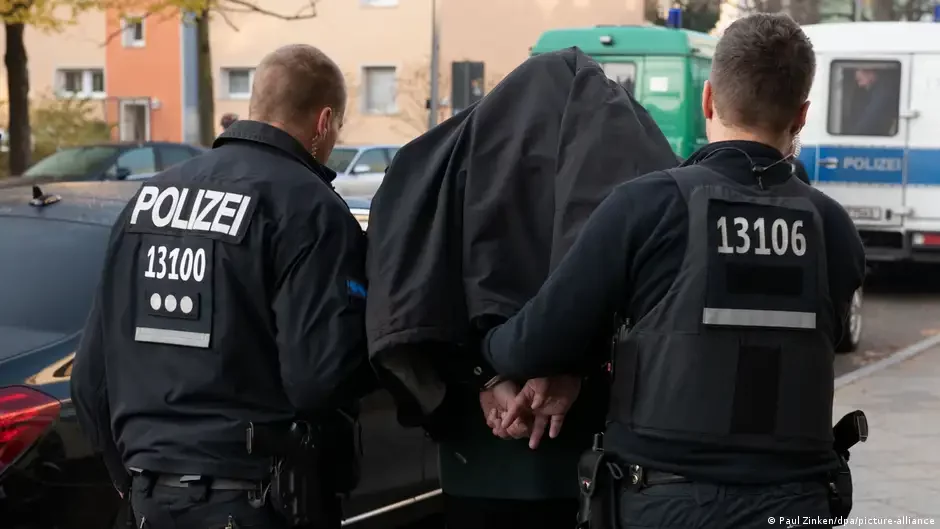
Even though it appears that people of non-German origin are more likely to be perpetrators, on the basis of crime statistics, Baier explains that this has little to do with nationality or country of birth, or indeed, whether or not you have migrated to Germany. "On the one hand, the social situation (education, work, housing) and, on the other hand, certain values that suggest, for example, violence as a means of conflict resolution also play a role. These values, including beliefs surrounding rigid masculinity norms, are not only found among migrants (and even then only among a small proportion), but also among Germans."
Wollinger adds that these statistics are often also distorted because non-German suspects are recorded more quickly, e.g. because certain districts are checked more frequently and they are more likely to be reported. However she highlights that a so-called "migration background" (someone who was born abroad, or born to parents born abroad) is often not directly identifiable by nationality.
Baier further highlights how isolated incidents, like knife attacks, are often used to generalize fears about migrants. "Migration and migrants are declared to be the cause of all crime problems," with simplistic solutions like deportations and closed borders often promoted by populists, he says.
Read AlsoGerman government planning more deportations to Afghanistan
Non-Germans more likely to be victims
The statistics also reveal that the number of non-German victims of crime increased by 15.2 percent in 2023 from 2022, with a sharper rise (19.1 percent) for those with "immigrant status". In 2023 the number of attacks on refugees increased by 75 percent, with 2,488 attacks recorded, 321 of which were violent. Additionally, 179 crimes against asylum shelters were recorded in 2023, marking an increase of approximately 50 percent compared to the previous year. Nearly 90 percent of these attacks were driven by far-right ideology, believe the authorities.
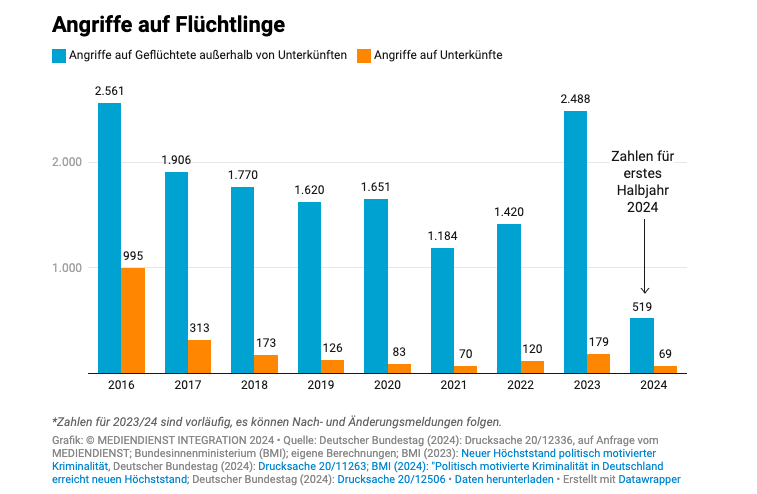
Wollinger points out that surveys show that "individuals from migrant backgrounds often feel less safe and have lower trust in law enforcement compared to the general population." This lack of confidence in authorities is further coupled with a pronounced fear of becoming a victim of a crime within these communities.
She adds that reasons for violence often differ, especially among young people, where ideas of masculinity and identity crises can also play a role. "Among refugees, for instance, a lack of future prospects can lead to violent behavior. Police crime statistics also show a higher proportion of non-German victims in knife attacks." Wollinger refers to a report on knife violence in public spaces in Germany's most populous state, North Rhine-Westphalia, which found that in 2023 of the 4,207 victims, over 34 percent were non-German despite being a significantly lower proportion of the population in the state (approx. 16.1 percent).
Germany has also seen a sharp rise in politically motivated and racist crimes. In 2023, the Ministry of the Interior recorded an all time high of 15,087 xenophobic crimes, a 50 percent increase from 2022. Around 77 percent of these crimes were politically right-wing motivated.
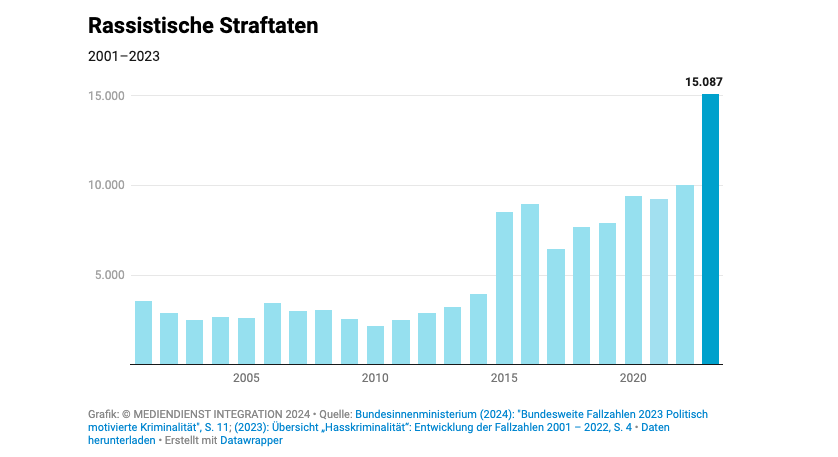
The "Association of Counseling Centers for Victims of Right-Wing, Racist and Anti-Semitic Violence"(VBRG) recorded 1,446 racist violent acts in 2023, a nearly one-third increase from 1,088 in 2022.
A 2021 study by the German Center for Integration and Migration Research (DeZIM) revealed that many victims of racism struggle to take effective action. Only a quarter of those affected reported incidents to anti-discrimination offices, took legal action, or raised public awareness. The researchers attributed this to structural racism and fear of being seen as the cause of the problem.
A long-term analysis by the Amadeu Antonio Foundation (an anti-right-wing racism foundation, set up in the name of a youth who was put into a coma after being beaten up by right-wing sympathizers because he was Black) reveals that attacks against refugees are often inadequately recorded by authorities. The study also highlights the need to simplify the process for registering such crimes, suggesting a standardized procedure with a lower burden of proof. Currently, the process requires evidence of explicit, personal threats of violence, overlooking implicit threats or those directed at groups and organizations.
Far right narratives and public perception
German far-right parties, such as the Alternative for Germany (AfD) have capitalized on fears related to crime, particularly knife crime, to promote their anti-immigration stance. Populist rhetoric used by some members of the party has focused on immigration, asylum policies, and "remigration," echoing the far-right's "great replacement" (a theory that suggests that other countries are attempting to 'replace' the indigenous population, in this case European populations, by means of arrival numbers and a higher birth rate in order to take over) theory.
While it is the crimes themselves that reinforce public fears, says Baier, the media and political discourse often amplify the issue: "There is no doubt that these crimes exist. But the decisive factor is that the media and political discourse focuses extremely intensely on individual acts."
These individual attacks are often "interpreted as a symptom of the state of an entire society. The fear is spread that something like this could happen anywhere and at any time in Germany," he adds.
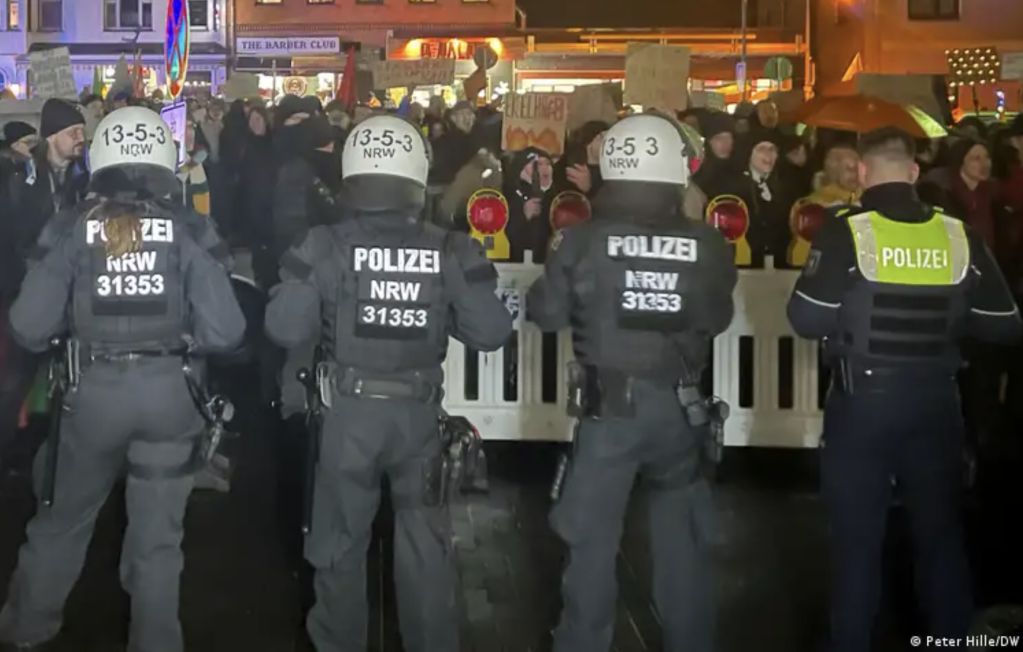
The rise of far-right populism, especially in eastern Germany, reflects deep social and economic divisions. The regions that would have formed the old East German states, are relatively economically underdeveloped compared to western Germany. Demographically, many of the youngest and brightest left to find jobs in the west, and the region since reunification in 1990, has seen significant migration outflows – often to western Germany. This has fed perceptions of neglect and economic hardship, with eastern Germans feeling that migrants receive more support than themselves.
Wollinger explains that historical experiences, such as those following German reunification, have helped shape a xenophobic attitude toward migration in eastern Germany. She cites the German sociologist Steffen Mau who notes that the shrinking population in eastern Germany has prompted some to develop a "defensive attitude towards migration," possibly due to experiences following reunification that heightened feelings of being left behind. Adding that this could "contribute to an identity core that opposes migration."
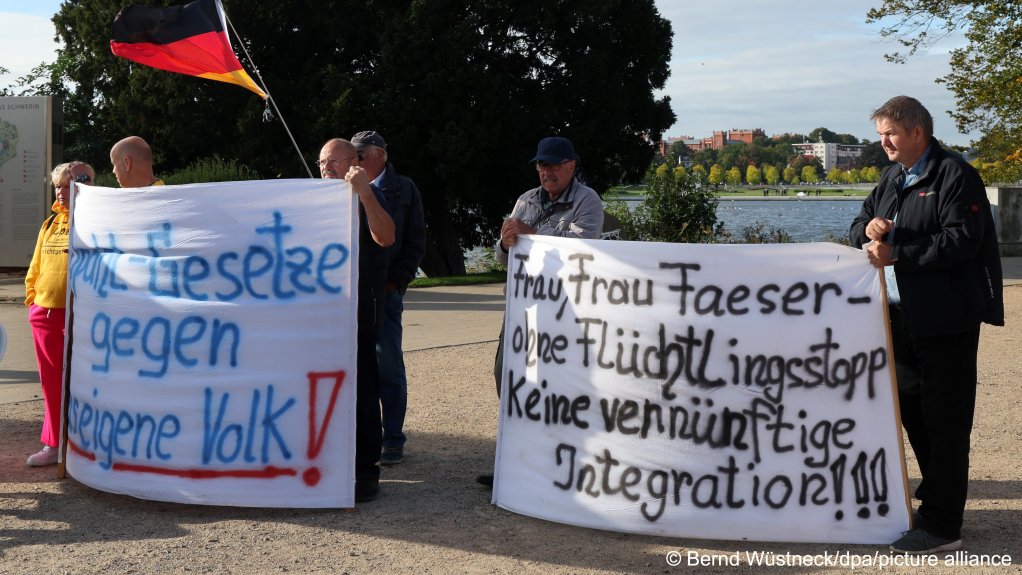
Baier argues that blaming migrants offers an easy, single explanation that fits the scapegoat narrative, making way for a simplistic solution: no more immigration, and the deportation of all migrants currently living in Germany, might just solve the very real economic problems many residents in these states are suffering. "A simple explanation – a simple solution, combined with the blaming of 'others.' Where it's not the Germans who are to blame, but the non-Germans."
Wollinger warns that "there is a need for a counterbalance in public perception to foster a more nuanced view of people with migration backgrounds and to challenge destructive narratives."
Read AlsoGermany: Immigrants in east wary of rising far-right AfD
Populism and Germany's labor shortage
In response to the Solingen attack in August that left eight people dead, German Interior Minister Nancy Faeser presented a new security package. The measures include a ban on knives at public events and on long-distance trains and buses, as well as a prohibition on switchblades. The package also tightens weapon licensing requirements to prevent access by extremists.
Additionally, it will cut welfare benefits for asylum-seekers if it is found that another EU state is responsible for their application under the Dublin agreement. Asylum status will be revoked for those who travel to their home countries without valid reasons (except for Ukrainian refugees). The reforms enhance police powers to counter potential Islamist threats and simplify deportation processes for foreigners committing crimes with weapons, potentially leading to denied asylum claims.
However, these measures by the government were not enough to sway the September Thuringia elections, where nearly half of voters supported either the AfD or the populist Sahra Wagenknecht Alliance (BSW), with the latter garnering 15.8 percent of the vote. Both parties advocate for stricter asylum policies, reflecting broader discontent. Similar shifts, away from the established parties and towards parties advocating getting tough on migration were identified in the other big eastern German state elections in Saxony and Brandenburg.
At the same time, it is precisely these regions that face a demographic challenge, with the labor force expected to shrink by 20 percent by 2040, exacerbating labor shortages in critical sectors such as healthcare, where more than three-quarters of vacancies remain unfilled.
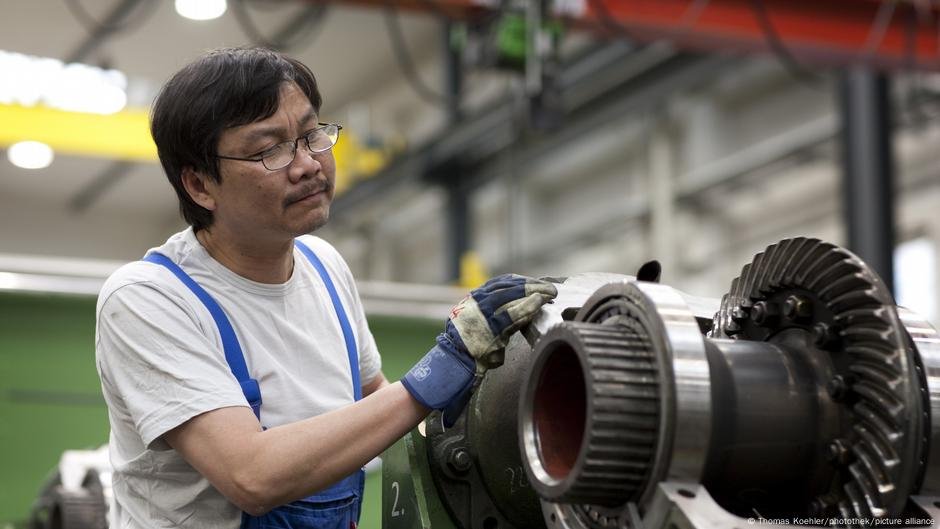
In states like Thuringia, where foreigners constitute only 7.6 percent of the population (compared to 14 percent in Bavaria), foreign workers contributed 24.6 billion euros ($27.6 billion) to the economy in 2023, accounting for 5.8 percent of the region's gross value. The number of foreign workers increased by 173,000 over the past five years, highlighting their growing role in the local labor force.
Far-right policies, that deter immigration and stir up xenophobia, have raised concerns in relation to future social cohesion but also to the country’s economic prospects. While asylum seekers are less likely to be deterred by these policies due to their lack of options, the broader message discourages skilled migrant labor that could actually help address Germany’s workforce gaps.
Germany is currently facing severe labor shortages, with around 700,000 positions unfilled – a figure projected to rise to seven million by 2035. Migrant labor is essential for economic recovery, especially in regions like those in eastern Germany, where rapid population decline and an aging workforce exacerbate the issue.

Last month, German Chancellor Olaf Scholz, who has come under fire both from the right and the left for his drive to attract foreign workers while resuming deportations to conflict regions, defended his government's migration policy in parliament, stating: "There is no country in the world with a shrinking working population that has economic growth. That is the truth we are confronted with."
He added that therefore an "openness" to the world is necessary. However, he argued that this "does not mean that anyone who wants to can come. We must be able to choose who comes to Germany."
Wollinger states that the handling of migration "remains problematic, with sustainable solutions and constructive dialog often lacking. There is no clear alternative migration policy. Right-wing populists and far-right forces are pushing the country further to the right with stricter deportation policies, even as it faces a labor shortage."
Read AlsoGermany's migration policy: Balancing labor needs and deportation
